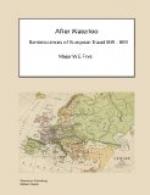Discite justitiam moniti et non temnere gentes.[48]
In their conduct on this occasion the French soldiers proved themselves far more constitutional than those of any other army in Europe; let despots, priests and weak-headed Tories say what they please to the contrary.
I embarked the following morning at 12 o’clock in the coche d’eau for Lyons. There was a very numerous and motley company on board: there were three bourgeois belonging to Lyons returning thither from Paris; a quiet good-humoured sort of woman not remarkable either for her beauty nor vivacity; a young Spaniard, an adherent of King Joseph Napoleon, very taciturn and wrapped up in his cloak tho’ the weather was exceeding hot; he seemed to do nothing else but smoke cigarros and drink wine, of which he emptied three or four bottles in a very short time—a young Piedmontese officer, disbanded from the army of the Loire, who no sooner sat down on deck than he began to chaunt Filicaja’s beautiful sonnet, “Italia, Italia, O tu cui feo la sorte,” etc.—a merchant of Lyons who had been some time in England, and spoke English well—a Lyonnese Major of Infantry, also of the army of the Loire, who had served in Egypt in the 32nd Demi-brigade; three Austrian officers of Artillery with their servants. A large barge which followed and was towed by the coche d’eau was filled with Austrian soldiers, and on the banks of the river were a number of soldiers of the Army of the Loire returning to their families and homes.




